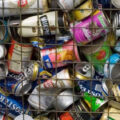Two German industry associations representing the non-ferrous metals industry, Aluminium Deutschland (AD) and WirtschaftsVereinigung Metalle (WVMetalle) declared their support for the strengthening of green programs for reuse, return and deposit, as agreed in the coalition pact.
Both associations also welcomed the announcement by the BMUV (German Federal Ministry for the Environment) that the draft law will allow the coexistence of various ecologically optimized packaging systems. However, both AD and WVMetalle criticized the ministry’s failure to take into account the expected European Union (EU) regulations.
Roland Leder, a leader of WVMetalle and also vice-president of AD, expressed his concern about the German government’s modification of the Packaging Law. In this regard, Leder reiterated that
“the amendment of the Packaging Law is a solitary German effort that is incomprehensible to our industry. In view of the planned new EU regulation, the German government’s action is not effective”.
One of the main novelties of this measure is the introduction of a reusable supply obligation for all final distributors of packaging. The BMUV estimates that this will affect at least 16,000 outlets in Germany. It is also expected that only European end distributors with a sales area of more than 400 m² will be affected by similar obligations, according to the current state of discussions.
The associations stressed that Germany could suffer from the consequences of the new regulations, especially since there is a higher percentage of small companies. This, however, will not be a reality in other member countries of the European Union.
Leder added: “A blanket promotion of reusable packaging by making it mandatory to offer reusable packaging is not desirable and is not based on scientific principles. This could displace deposit packaging, such as beverage cans, which play an important role alongside reusable systems in the competition between environmentally optimized packaging systems. Cans are almost entirely returned to stores by citizens so that they can be put back into circulation.” According to retailers’ estimates, the new mandatory reusable offer would greatly increase logistics costs, because reusable systems require many more truck trips in the collection process.
Leder also emphasized that “a widespread promotion of reusable packaging by making it mandatory to offer reusable packaging is not desirable and is not based on scientific principles. This could displace deposit packaging, such as beverage cans, which play an important role alongside reusable systems in the competition between environmentally optimized packaging systems. Cans are almost entirely returned to stores by citizens so that they can be put back into circulation.” According to retailers’ estimates, the new mandatory reusable offer would greatly increase logistics costs, because reusable systems require many more truck trips in the collection process.














